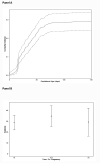Lifestyle and pregnancy loss in a contemporary cohort of women recruited before conception: The LIFE Study
- PMID: 27016456
- PMCID: PMC4930884
- DOI: 10.1016/j.fertnstert.2016.03.009
Lifestyle and pregnancy loss in a contemporary cohort of women recruited before conception: The LIFE Study
Abstract
Objective: To estimate pregnancy loss incidence in a contemporary cohort of couples whose lifestyles were measured during sensitive windows of reproduction to identify factors associated with pregnancy loss for the continual refinement of preconception guidance.
Design: Prospective cohort with preconception enrollment.
Setting: Sixteen counties in Michigan and Texas.
Patient(s): Three hundred forty-four couples with a singleton pregnancy followed daily through 7 postconception weeks of gestation.
Intervention(s): None. Couples daily recorded use of cigarettes, caffeinated and alcoholic beverages, and multivitamins. Women used fertility monitors for ovulation detection and digital pregnancy tests. Pregnancy loss was denoted by conversion to a negative pregnancy test, onset of menses, or clinical confirmation depending upon gestation. Using proportional hazards regression and accounting for right censoring, we estimated adjusted hazard ratios and 95% confidence intervals (aHR, 95% CI) for couples' lifestyles (cigarette smoking, alcoholic and caffeinated drinks, multivitamins) during three sensitive windows: preconception, early pregnancy, and periconception.
Main outcome measure(s): Incidence and risk factors for pregnancy loss.
Result(s): Ninety-eight of 344 (28%) women with a singleton pregnancy experienced an observed pregnancy loss. In the preconception window, loss was associated with female age ≥35 years (1.96, 1.13-3.38) accounting for couples' ages, women's and men's consumption of >2 daily caffeinated beverages (1.74, 1.07-2.81; and 1.73, 1.10-2.72, respectively), and women's vitamin adherence (0.45, 0.25-0.80). The findings were similar for lifestyle during the early pregnancy and periconception windows.
Conclusion(s): Couples' preconception lifestyle factors were associated with pregnancy loss, although women's multivitamin adherence dramatically reduced risk. The findings support continual refinement and implementation of preconception guidance.
Keywords: Caffeine; lifestyle; miscarriage; multivitamins; pregnancy loss.
Published by Elsevier Inc.
Figures


References
-
- Vaitukaitis JL, Braunstein GD, Ross GT. A radioimmunoassay which specifically measures human chorionic gonadotropin in the presence of human luteinizing hormone. Am J Obstet Gynecol. 1972;113:751–8. - PubMed
-
- Braunstein GD. The long gestation of the modern pregnancy. Clin Chem. 2014;60:18–21. - PubMed
-
- http://www.bloomberg.com/bw/articles/2013-11-27/clearblue-wins-overthe-p... (Accessed September 1, 2015)
-
- http://www.statista.com/statistics/296137/top-ten-us-over-the-counter-br... (Accessed September 1, 2015)
-
- http://www.clearblueeasy.com/healthcare/heritage-of-clearblue.php (Accessed September 1, 2015)
Publication types
MeSH terms
Substances
Grants and funding
LinkOut - more resources
Full Text Sources
Other Literature Sources
Medical

